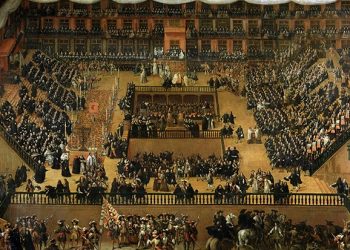Human Lives Human Rights: Publishing the Quran and making it available in translation was a dangerous enterprise in the 16th century, apt to confuse or seduce the faithful Christian. This, at least, was the opinion of the Protestant city councilors of Basel in 1542, when they briefly jailed a local printer for planning to publish a Latin translation of the Muslim holy book. The Protestant reformer Martin Luther intervened to salvage the project: there was no better way to combat the Turk, he wrote, than to expose the ‘lies of Muhammad’ for all to see.
The resulting publication in 1543 made the Quran available to European intellectuals, most of whom studied it in order to better understand and combat Islam. There were others, however, who used their reading of the Quran to question Christian doctrine. The Catalonian polymath and theologian Michael Servetus found numerous Quranic arguments to employ in his anti-Trinitarian tract, Christianism Restitutio (1553), in which he called Muhammad a true reformer who preached a return to the pure monotheism that Christian theologians had corrupted by inventing the perverse and irrational doctrine of the Trinity. After publishing these heretical ideas, Servetus was condemned by the Catholic Inquisition in Vienne, and finally burned with his own books in Calvin’s Geneva.
Spanish theologian and physician Michael Servetus crossed the red line, until the Spanish Inquisition blacklisted him. Since burning was a common way of punishing heretics, and because Michael had crossed red lines that no one dared to approach, his punishment had to be different, and according to some historical sources, he was burned three times, in order to be a lesson to those who do not think the same way, the Michael did.
Who was Michael Servetus and why was he punished?
Restoring Christianity
During the 16th Century Michael spent his childhood in Spain. He learned Hebrew and Greek at an early age. When he was a teenager, he went to France to study law and later worked as a secretary to a monk named Juan de Quintana. This job allowed him to travel throughout Europe and get to know different cultures. These trips opened a window for the popes, through which, according to Michael, some corruption could be seen clearly.
These observations casted doubt in Michael’s heart about Christianity, to the extent that he researched the Bible in Hebrew and Greek, and concluded that translating the Bible from the original into Greek had some doctrinal foundations. Michael researched these distortions and biblical editions, and published his detailed research on Christian theology and the core requirements of the church, in his book “De Trinitatis Erroribus” in 1531 during his lifetime in Spain.
This is a title that does not require reading a book description to understand its contents. This was the beginning of a clear animosity between Michael and the church. The church members accused him of heresy because he did not believe in the principle of the Trinity, which was the basis of Christianity, which provoked both Catholics and Protestants to take revenge on him. He was compelled to travel to France again and studied medicine for a long time.
At that time, he began a series of correspondences with John Calvin, the leader of the Protestant Reformation in Geneva, and soon the differences between the two became apparent, and Calvin realized that Michael’s ideas had crossed red lines. He did not respond to Michael’s letters after that, and in 1546, while writing to a friend, he wrote about Michael: If Michael Servetus came here, I would not let him go out of this city alive!
Anyone who understands how man breathes, will feel God in his heart!
The challenges could not stop Michael from thinking, and his study of medicine and the human body, which he considered a pure miracle, contributed to his desire to understand religion and God, and for this reason he wrote the book “The Restoration of Christianity”, it was a special book that combined theological and medical thought. He said that a physician must understand the ability of the Creator to give spirit to the human body in order to study medicine. He mainly thought about the process of human respiration. The process of breathing attracted his mind as a testimony to the presence of God, and in this book, he said: God is in my heart, and in every breath, God saves us!
This book was published in 1552. This book contained ideas contrary to the principles of the Christian faith, but also included new things in Europe at the time, and presented pioneering theories of the Pulmonary Circulation based on the discoveries of the Muslim physician Ibn Nafees, and thus he became the first physician to challenge the Greek theories of Galen on the circulation of blood.
Michael Servetus’s theories have been prevalent in medical schools around the world for more than 14 centuries, and although he was not given ample opportunity to prove his theories, he opened many doors for other physicians to review and then reconsider them and acquire new information about human anatomy and physiology, which is still being discussed globally.
After writing this book, which is considered by some to be one of his most important books, he lived in Vienna, although John Calvin ignored him, but Michael sent him a copy of this book, unaware that he was signing his death certificate by signing his name on the book. When John read the book and its revolutionary beliefs based on religion and medicine, he ordered his arrest, but Michael escaped.
However, he was soon found in Geneva in 1553 and was accused of heresy and was burned at the stake, and almost all of his books were burned shortly after his death, but some rare copies of his book remained. Those copies are kept in the National Library of France and the Library of the University of Edinburgh and the National Library of Austria.

















